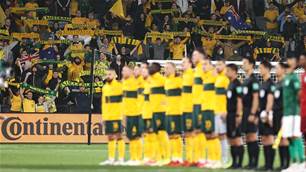Qatar is a tiny Middle Eastern nation, occupying a peninsula off Saudi Arabia, jutting out into the Persian Gulf.
A British protectorate for much of the 20th century, it began taking its own independent strides in the 1970s. The economy, flooded with petrodollars, is fuelled by foreign labour which makes up the bulk of the Qatari workforce, creating a country with a national identity that is vague at best.
Qatar’s national team reflects this dynamic. Key players in the squad, like star striker Sebastian Soria and captain Abdulla Obaid Koni, are naturalised Qataris, having been lured to the country by the money available in the rich Qatari league. Players like Soria and Koni, anonymous in their homelands, have accepted the invitation of the Qatari football federation, along with the domestic favour that comes with it.
Soria is an interesting example. The Uruguayan, just weeks before last year’s Asian Games tournament, took up the invitation of Qatari citizenship. The pressure was on the hosts to perform in front of their home fans, and they saw Soria’s power and pace as the ingredient the Qatari side needed. The striker had been scoring regularly for first Al-Gharrafa and then Qatar Sports Club over the last three seasons but, facing the reality that he would never be recognised by Uruguay, Soria the switch. He scored the first goal of the Asian Games tournament and was key to the team’s success, adding three more goals.
While sceptics may question the timing of his change of allegiance, it is hard to argue with his choice. A former bit-part player of the Liverpool club in Uruguay, Soria’s life has been transformed by the move.
This culture of augmentation has developed Qatar into an extremely capable football side, with its own technically proficient youth augmented by the flair, leadership and power of its imports. Recent achievements include the Gulf Cup title in 2004 and the gold medal at the Asian Games of 2006 for their U23 side.
Former coach Phillipe Troussier was a happy supporter of naturalising players. “It’s probably the only means to one day qualify Qatar for a World Cup,” he said. Of course, Troussier had previously benefited from using the Brazilian-born Alessandro dos Santos during his time coaching Japan. New coach Dzemaludin Musovic, despite including Soria, and the Senegalese duo of goalkeeper Ahmed and captain Koni, has at least been outwardly committed to fostering a Qatari core. “We have to be careful that we don’t take it too far. Artificial things are not good. [Soria, Koni and Ahmed] have all been in Qatar for a while now, and they have all decided to play for us.”
The need for these foreigners is something of a sorry situation. Youth development has always been a high priority for Qatar, and they have the achievements to prove so. Veteran Australian football fans will remember the 1981 Youth World Championship in Australia. Qatar made it all the way to final before losing to West Germany. This was no fluke. Some 10 years later, they almost emulated the feat but went out in the semi-finals. They have also finished runner-up in the AFC U17 Championship on an improbable five occasions. In addition to Khalfan Ibrahim’s success, Waleed Hamza was awarded the AFC’s Young Player of the Year in 1999, succeeding Japanese star Shinji Ono.
Apart from one or two success stories though, the need for naturalised foreigners has been brought about not only by the small Qatari population, but also by the local players’ deficiencies. Spoiled by a comfortable lifestyle, and watching older professionals such as Marcel Desailly and the De Boer brothers who chose the easy money of Qatar as their final payday, young Qatari players are said to lack mental toughness. “Waleed Jassem Abdulla is a 20-year-old striker of immense promise, but unfortunately he does not seem to have the right attitude,” Musovic offers as an example of a typical young Qatari. “He was quite brilliant a couple of years ago, but now he is warming the bench at Al-Rayyan because he doesn’t apply himself as he should.”
The recent Gulf Cup and Asian Games successes were both achieved in the familiar, luxurious surrounds of Qatar. It’s a historical trend, with Qatar’s only other Gulf Cup success coming in the 1992 tournament, which they also hosted. Performances in recent competition away from home have been less impressive, with the team finishing bottom of their group in January’s Gulf Cup in UAE. When faced with a challenge the Qataris have a track record of shutting up shop. In qualification for the 2006 World Cup, the only result achieved away from home was a win against Laos. As Musovic has said, “young players often rest on their laurels instead of being determinate to develop further by battling and striving to reach greater heights. It must be said that some footballers in Qatar do not have the determination and drive to succeed.”
For this reason, Qatar may struggle as early as the group stages at the Asian Cup, with a likely battle with UAE for the group’s second qualifying spot. Though the team will be travelling to Vietnam early to acclimatise, and have arranged a friendly against Thailand, question marks hang over the ability of the players to adjust to the thick humidity of Hanoi as well as the challenges expected in areas of general infrastructure and organisation.
FourFourTwo verdict
Vying for second with UAE, but until the Qataris strut out for their first match, we won’t know whether they mean business.
Qatar’s national team reflects this dynamic. Key players in the squad, like star striker Sebastian Soria and captain Abdulla Obaid Koni, are naturalised Qataris, having been lured to the country by the money available in the rich Qatari league. Players like Soria and Koni, anonymous in their homelands, have accepted the invitation of the Qatari football federation, along with the domestic favour that comes with it.
Soria is an interesting example. The Uruguayan, just weeks before last year’s Asian Games tournament, took up the invitation of Qatari citizenship. The pressure was on the hosts to perform in front of their home fans, and they saw Soria’s power and pace as the ingredient the Qatari side needed. The striker had been scoring regularly for first Al-Gharrafa and then Qatar Sports Club over the last three seasons but, facing the reality that he would never be recognised by Uruguay, Soria the switch. He scored the first goal of the Asian Games tournament and was key to the team’s success, adding three more goals.
While sceptics may question the timing of his change of allegiance, it is hard to argue with his choice. A former bit-part player of the Liverpool club in Uruguay, Soria’s life has been transformed by the move.
This culture of augmentation has developed Qatar into an extremely capable football side, with its own technically proficient youth augmented by the flair, leadership and power of its imports. Recent achievements include the Gulf Cup title in 2004 and the gold medal at the Asian Games of 2006 for their U23 side.
Former coach Phillipe Troussier was a happy supporter of naturalising players. “It’s probably the only means to one day qualify Qatar for a World Cup,” he said. Of course, Troussier had previously benefited from using the Brazilian-born Alessandro dos Santos during his time coaching Japan. New coach Dzemaludin Musovic, despite including Soria, and the Senegalese duo of goalkeeper Ahmed and captain Koni, has at least been outwardly committed to fostering a Qatari core. “We have to be careful that we don’t take it too far. Artificial things are not good. [Soria, Koni and Ahmed] have all been in Qatar for a while now, and they have all decided to play for us.”
The need for these foreigners is something of a sorry situation. Youth development has always been a high priority for Qatar, and they have the achievements to prove so. Veteran Australian football fans will remember the 1981 Youth World Championship in Australia. Qatar made it all the way to final before losing to West Germany. This was no fluke. Some 10 years later, they almost emulated the feat but went out in the semi-finals. They have also finished runner-up in the AFC U17 Championship on an improbable five occasions. In addition to Khalfan Ibrahim’s success, Waleed Hamza was awarded the AFC’s Young Player of the Year in 1999, succeeding Japanese star Shinji Ono.
Apart from one or two success stories though, the need for naturalised foreigners has been brought about not only by the small Qatari population, but also by the local players’ deficiencies. Spoiled by a comfortable lifestyle, and watching older professionals such as Marcel Desailly and the De Boer brothers who chose the easy money of Qatar as their final payday, young Qatari players are said to lack mental toughness. “Waleed Jassem Abdulla is a 20-year-old striker of immense promise, but unfortunately he does not seem to have the right attitude,” Musovic offers as an example of a typical young Qatari. “He was quite brilliant a couple of years ago, but now he is warming the bench at Al-Rayyan because he doesn’t apply himself as he should.”
The recent Gulf Cup and Asian Games successes were both achieved in the familiar, luxurious surrounds of Qatar. It’s a historical trend, with Qatar’s only other Gulf Cup success coming in the 1992 tournament, which they also hosted. Performances in recent competition away from home have been less impressive, with the team finishing bottom of their group in January’s Gulf Cup in UAE. When faced with a challenge the Qataris have a track record of shutting up shop. In qualification for the 2006 World Cup, the only result achieved away from home was a win against Laos. As Musovic has said, “young players often rest on their laurels instead of being determinate to develop further by battling and striving to reach greater heights. It must be said that some footballers in Qatar do not have the determination and drive to succeed.”
For this reason, Qatar may struggle as early as the group stages at the Asian Cup, with a likely battle with UAE for the group’s second qualifying spot. Though the team will be travelling to Vietnam early to acclimatise, and have arranged a friendly against Thailand, question marks hang over the ability of the players to adjust to the thick humidity of Hanoi as well as the challenges expected in areas of general infrastructure and organisation.
FourFourTwo verdict
Vying for second with UAE, but until the Qataris strut out for their first match, we won’t know whether they mean business.
Related Articles

Australian government commends Qatar on World Cup

Socceroos' World Cup hopes dire after Oman Draw













